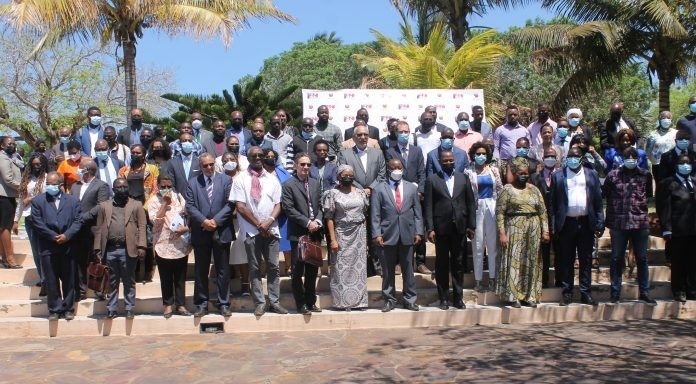

The event was attended by undergraduates and graduate students from Mozambique, Brazil, Colombia, Cuba and Portugal (photo: FNI)
The event was attended by undergraduates and graduate students from Mozambique, Brazil, Colombia, Cuba and Portugal.
The event was attended by undergraduates and graduate students from Mozambique, Brazil, Colombia, Cuba and Portugal.

The event was attended by undergraduates and graduate students from Mozambique, Brazil, Colombia, Cuba and Portugal (photo: FNI)
By André Julião | Agência FAPESP – Development of bamboo structures that can be quickly assembled to serve as environmental disaster relief shelters or infirmaries; food conservation and local fruit processing solutions; systems to avoid wastage of water and power – studies on these and other topics were presented during the Third International Scientific Research Seminar, held on October 21-23 virtually and in person by the National Research Fund (FNI), an agency of Mozambique’s Ministry of Science, Technology and Higher Education, which has had a cooperation agreement with FAPESP since 2019.
Mozambican undergraduates and graduate students delivered most of the presentations, but Brazil, Colombia, Cuba and Portugal also had research projects selected for presentation. Two holders of scholarships awarded by FAPESP delivered engineering-related presentations.
“The solutions presented were linked to a good cross-section of the problems Mozambique faces and can serve as inspiration for Brazilian researchers. The two countries have much in common in terms of culture, climate and social organization. A great deal that’s useful in one of them could be useful in the other,” said Holmer Savastano Junior from the University of São Paulo’s School of Animal Science and Food Engineering (FZEA-USP) in Pirassununga (Brazil), where he works as professor in the Department of Biosystems Engineering. A member of FAPESP’s Engineering Area Panel, Savastano integrated the scientific committee for the seminar.
“The main aim of the event was to publicize the research done in Mozambique in several knowledge areas and let local researchers meet colleagues from other countries as a first step in collaborating and exchanging visits with them,” said Gherhardt Ribatski, a professor at the university’s São Carlos School of Engineering (EESC-USP). Ribatski is also a member of FAPESP’s Engineering Area Panel and the scientific committee for the seminar.
Projects
Iranian-born researcher Marzieh Kadivar lives in Brazil and earned a PhD at FZEA-USP with a scholarship from FAPESP. She is currently supported by the FAPESP Innovative Research in Small Business Program (PIPE).
She presented the results of a project involving the development of high-performance materials based on bamboo densification that can be used to build low-cost structures and panels quickly for people in critical situations, such as families left homeless by natural disasters, for example.
Adriano de Souza Azevedo, a postdoctoral intern at FZEA-USP, presented partial results of a project to develop a type of cement containing plant fibers.
On the Mozambican side, novel food engineering solutions using local fruits included a process for production of palm wine, presented by Eleuterio Mapsanganhe, and addition of baobab fruit (Adansonia digitata) to fortify wheat and cassava starch biscuits, presented by Osório Ernesto Mucocossalane.
Innovative water treatment plant design software, presented by Agnercio Maria Sambo, and an electronic alarm system to prevent excessive water consumption, presented by Adriano Muvambo, were among the Mozambican projects relating to efficient use of water resources.
“Mozambique’s graduate studies sector is embryonic, but it has highly capable researchers who can contribute both in the African context and to Brazilian research,” Savastano said. “We hope to see scientific collaboration between the two countries intensifying thanks to this event, with benefits for both.”
Republish
The Agency FAPESP licenses news via Creative Commons (CC-BY-NC-ND) so that they can be republished free of charge and in a simple way by other digital or printed vehicles. Agência FAPESP must be credited as the source of the content being republished and the name of the reporter (if any) must be attributed. Using the HMTL button below allows compliance with these rules, detailed in Digital Republishing Policy FAPESP.





